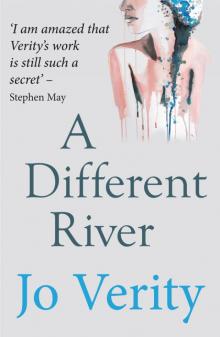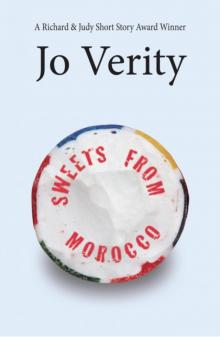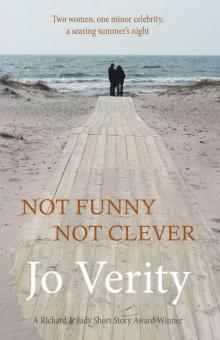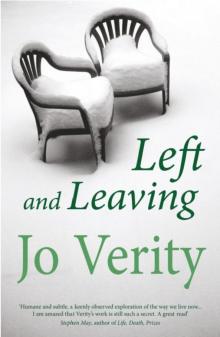Left and Leaving Read online
Contents
Title Page
Also by Jo Verity
Dedication
Acknowledgements
1
2
3
4
5
6
7
8
9
10
11
12
13
14
15
16
17
18
19
20
21
22
23
24
25
26
27
28
29
30
31
32
33
34
35
36
37
38
39
40
41
42
43
More From Honno
About Honno
Copyright
LEFT AND LEAVING
Jo Verity
HONNO MODERN FICTION
Also by Jo Verity and available from Honno
Everything in the Garden
Bells
Sweets from Morocco
Not Funny Not Clever
For
Fin and Sam
Sylvie and Enzo
Acknowledgements
My sincere thanks to: Caroline Oakley for her encouragment, editorial expertise and friendship; everyone at Honno for continuing to support my writing; Cardiff Writers’ Circle for constructive criticism; Stephen May and Eddy Walsh for taking time away from their own writing to read this; Ramesh Pydiah, Medical Photographic Manager at UCLH; Dr. Michael Shapter – sorry Mike; and The Weakerthans for the music.
Finally, thanks to Jim for helping fathom the desires and motives of people who exist only between the covers of this book.
1
Vivian hadn’t seen Nick for over a week.
‘Miss me?’ he said, planting a kiss on her cheek.
‘Not at all,’ she said.
It was a shame, but she hadn’t. And her week had been simpler for not having to factor him into it.
She took his coat and hung it on the peg. ‘How was Oslo?’
‘Stockholm,’ he said.
She had no idea why he’d gone to Sweden. Or why he’d been to Newcastle the previous week. They’d agreed, a while back, that banging on about work got them nowhere. They were both permanently under pressure and ‘a trouble shared’ was merely an additional burden.
‘Did you get off with lots of sexy Swedes?’ she said.
‘Just the one.’
A double bluff? Surely the very possibility should arouse a twinge of…something. No? At least she didn’t spend hours moping or roiling with jealous suspicions. (And yet. Once in a while, a film or poem or piece of music tweaked – for the want of a better explanation – her heart, leaving her feeling short-changed, regretful that she didn’t crave more from her lover.)
‘I’ve never been to Stockholm,’ she said.
‘Stylish city. But bloody cold.’ He pulled a hat from his coat pocket and jammed it on his head. ‘I was forced to buy this.’
The khaki hat, lined with fake fur, had earflaps and a peak that could be fastened back. He turned to face her, jutting out his chin, gripping the bowl of an imaginary pipe, fixing his gaze on an imaginary fjord. ‘What d’you reckon?’
Nick Mellor was handsome. Dark hair, grey eyes, straight nose, white teeth. He was tall, too, a plus point for Vivian who was five-eight.
She’d been introduced to him several years ago, at a dinner party thrown by mutual friends. It was a set-up, of course. She’d grown accustomed to being a project for couples who wanted the whole world to be as happily paired as they insisted they were. She and Nick had hit it off and things had progressed from there.
In the beginning, they’d made time for each other in their busy lives but, as they both scrambled up career ladders, the need to be deemed indispensable became a full-time job. They got on well enough but, as time went by, they spent less and less of it together. Her phone logged a string of texts confirming this. ‘Still at work.’ ‘Shattered. Can we leave it tonight?’ She often wondered why they bothered. On the other hand it was easier to be part of a couple than to explain why she wasn’t. But, unless something changed, whatever they had wasn’t going anywhere. Two more young professionals without the energy or desire to make their relationship flourish.
‘Mmmm. Something smells good,’ he said.
‘Duck confit with a red wine jus.’
‘Blimey, that’s impressive’
‘Waitrose,’ she said. ‘Just in case you think I’ve morphed into a domestic goddess whilst you’ve been away.’
‘It still smells good.’
After they’d been together for a year or so, the question of their living together had come up. It was what couples in their mid-thirties did, and there were half-a-dozen reasons why they should. But, with the property market threatening to nosedive, they’d agreed that it was the wrong time to sell, and that it would be wiser to hang on, to see how things panned out.
To be truthful, Vivian had been relieved that they’d found a credible reason for leaving things as they were. She’d never been good at living with other people. She’d disliked those obligatory years of student flat-shares – the chaos, the lack of privacy, those alien cooking smells. As soon as she’d qualified and found a job, she’d rented a studio flat in Finsbury Park, preferring the hassle of a flap-down bed to housemates who left damp towels on the bathroom floor and bags of rubbish mouldering in the kitchen. She’d recently heard of a couple who, despite marrying, had continued to live separately. It wasn’t as crazy as it sounded.
Five years ago, when her mother died, Vivian had discovered she was the beneficiary of her life insurance policy. (In making plans, her parents had assumed her father would be the first to go – not unreasonable as he was so much older than his wife.) The six-figure sum had enabled her to buy this flat. It was a bitter-sweet route to property-ownership, but there was no doubt her mother would have approved of her spending the money in this way.
‘How’s your dad?’ Nick said as they sat down to their meal.
‘Okay. I think. I haven’t seen him for a few weeks.’ She glanced up from her plate. ‘I’m going down on Saturday. D’you fancy coming?’
She watched him struggle to frame his excuse. ‘Saturday. Mmmm. Damn. I’ve got…this, this thing…’
She held his gaze until he looked away. ‘It’s time I told him about Cologne.’
‘It’s definitely on then?’ he said.
‘Yes. I’ll go in January.’
‘How d’you think he’ll take it?’
‘I have no idea.’
When the possibility of her working in Germany came up, Nick hadn’t seemed concerned but she wondered whether he was still as sanguine.
‘You’re okay with it?’ she said.
‘Sure.’ He smiled. ‘It’s no more of a problem than if you worked in…in Glasgow. In fact, Cologne is probably nearer than Glasgow.’
What sort of an answer was that?
‘So what are your plans for Christmas?’ he said.
They were barely into November. Forward-planning wasn’t his thing and she was surprised by his question. For a moment she wondered whether he was planning to whisk her away. Somewhere hot. White sand beaches. Azure seas.
‘Why?’ she said.
‘The guys in work want me to go skiing.’
‘Oh.’
‘Actually they asked me months ago and I said no. But someone’s dropped out. I sort of assumed you’d be s
pending Christmas with your dad.’
‘Yes, I suppose I shall,’ she said.
‘Look, Vivian, I won’t go if…’
‘Of course you must go,’ she said. ‘Christmas is no big deal. It’s just another day, after all.’
Christmas loomed ahead, an iceberg in the winter fog. If she didn’t spend it with her father, he would be on his own. She suspected that he wouldn’t care but, fanciful though it was, she felt that, in abandoning him, she would let her mother down.
Annaliese Carey – her mother – hailed from Munich and, as a child, Vivian had adored the family’s German Christmases. They’d made her feel special. Interesting. Different. No one else she knew woke on the sixth of December to find their shoes filled with sweets. No one else opened their presents on Christmas Eve. No one else ate goose and dumplings for Christmas dinner, or hung picturesque wooden decorations on their tree. (Always a real tree that touched the ceiling and filled the house with the dark scent of Bavarian forests.)
Even after leaving home, when Christmases had stopped feeling ‘special’, she’d returned to celebrate with her parents, arriving as late as was possible on Christmas Eve and finding an excuse – parties, friends, even work – to escape on Boxing Day. Her mother must have seen through her excuses but she’d never pressed her to stay longer.
Nick kissed her cheek. ‘Let’s make sure we do something special for New Year.’
‘Yes, let’s,’ she said.
Belsize Park Tube was a ten-minute walk from Vivian’s flat. If there were no hitches on the Northern Line, her journey to work took thirty-five minutes.
Friel Dravid Associates’ offices were located off the Caledonian Road. The building had begun life as premises for a firm of carriers whose horse-drawn carts conveyed goods from Kings Cross railway station all over the city. When horses were superseded by motor vehicles, the owner had sold the building to a circus impresario who – or so the story went – had used it to house an elephant until planning regulations had overtaken him. Percy Friel had acquired the property in the early sixties when he and Bharat Dravid were setting up Friel Dravid. They’d restored and refurbished it (the scheme had been written up in the Architects’ Journal) and the quirky building became known as ‘The Elephant House’. By the time Vivian joined the firm, Dravid was dead, Percy Friel had retired and his son, Howard, had taken over.
When Vivian arrived at work, Ottilie – the office manager – was in the kitchen, arranging showy chrysanthemums in a gigantic glass vase.
‘They’re stunning,’ Vivian said.
‘They were pricey, but they’ll last,’ Ottilie said standing back and squinting at the bronze blooms. ‘White’s classier. But you know me. I can’t resist a splash of colour. Howard’s looking for you, by the way.’
Vivian bit her lip in mock trepidation. ‘Oh dear. What have I done now?’
She knew she’d done nothing wrong. She also knew that Howard Friel, who could be a hard taskmaster, trusted her to do a good job. He liked her, too, and they’d become friends. He sometimes moaned to her about his children – both in their thirties, both something in the baffling world of City banking. ‘Where did we go wrong? They don’t have an iota of creativity between them. Or a jot of social conscience.’
‘He’s in his office. Could you take him a coffee?’ Ottilie nodded towards the industrial-scale coffee machine that kept the office buzzing throughout the day.
Vivian poured two mugs of coffee and carried them up the spiral staircase to the first floor. As usual, the door to Howard’s office was open and he was seated at his desk.
Howard Friel was sixty-two but with his wiry frame and abundant iron-grey hair, he could have passed for fifty. He had a quiet, authoritative manner which set him slightly apart, as if he were an anthropologist observing humankind. Yet he was approachable and open-minded, ready to listen and, when asked, to give an opinion. Vivian sometimes pretended to herself that Howard was her father. It would have made more sense if he had been.
He looked up from his screen and beckoned her in. ‘Coffee. Wonderful.’
‘You wanted to see me?’ she said.
He signalled for her to sit down. ‘We should try and fit in a Cologne visit before Christmas. You, me and Ralph. We need to meet the contractor. Firm up the schedule. Maybe we could take a look at offices. Get a few viewings lined up.’
‘Sounds good.’
‘Cara’s keen to tag along. Would that be okay with you?’
Vivian meant it when she said, ‘Of course. It’ll be fun.’
Cara, Howard’s wife of thirty-odd years, was a jewellery designer. She was a handsome, buxom woman. Always laughing. Everyone cheered up when Cara was around, jingling with jewellery and oozing vitality. The couple exuded an aura of well-being which infected everyone around them. At the office summer party, asked by a young man (who had downed too many glasses of Pimms and who was a week away from his own wedding day) for her recipe for a successful marriage, Cara had replied ‘Shared baths. Dancing in the kitchen. And a firm hold of the leash.’
Vivian, also a little drunk, had tried to imagine what her parents would have come up with if anyone had asked them the same question. She had not the faintest idea – but then she had no idea whether her parents had considered theirs to be a successful marriage.
2
Gil tapped his pockets. A few weeks ago he’d locked himself out and since then he’d taken to frisking himself before pulling the door shut. Keys. Wallet. Phone. I.D. His mother would be proud of him. He was fifty-one years old, and she lived on the other side of the world, yet she still nagged him to eat a ‘proper’ breakfast and to get his hair trimmed when it reached his collar. (Skype was a mixed blessing.)
He jabbed a thumb on the light switch then hurried down the two flights of stairs, taking up the daily challenge to make the front door before the switch popped out and stranded him in darkness. Yes. Five days in a row. He was heading for a record.
Bending, he scooped up the leaflets strewn across the scuffed vinyl. At the tenants’ most recent ‘hall and stairs’ meeting they’d agreed to keep on top of this menace. He glanced through the batch of flyers. Cabs, takeaways, ‘scrap’ gold for cash, dry cleaners, men with vans, and men with drain-rods. A reflection of the aspiration – and desperation – of North Londoners in twenty-ten. Having made sure that there were no genuine items of mail amidst the junk, he dropped the lot into the bin that they’d all pitched in to buy.
Leaving the house, he descended the half-dozen steps to the pavement then slipped through the gate in the iron railings and down the stairs to the basement flat. He rapped on the door. Beyond it, Feray was shouting at the kids. He couldn’t make out what she was saying, or whether she was speaking English or Turkish, but he knew she would be threatening them with reprisals if they didn’t shift. It was the same every weekday morning.
When she came to the door she looked frazzled, a frown darkening her eyes, her lips set tight.
‘What is their problem?’ she said, shaking her head.
‘God, you look sexy when you’re angry.’
She arched an eyebrow and held his gaze. He’d persuaded her to do just that when he’d last photographed her. ‘Come on,’ he’d said. ‘It makes you look hot. Like Gardner or Bacall.’ ‘Bullshit,’ she’d said, but she’d complied and the portrait – he’d gone for black and white – took pride of place on her living room wall.
‘You coming in?’ she asked.
‘Got to get to work. I wondered whether you’d like me to cook supper tonight. For all of us.’
Her expression softened. ‘That’d be nice.’
James and Melissa were bickering in the background. Their complaining voices evoked the sniping that had gone on between him and his sisters when they were this age.
‘Six-thirty-ish?’ he said.
She nodded.
He leant forward and kissed her hastily on the lips. ‘Gotta go.’
Pulling his collar up around his ears, he sh
oved his hands in his jacket pockets and headed for the bus stop.
On days like this, when the pewter sky squatted no more than a few metres above the rooftops, he had to remind himself that, of his own free will, he had chosen north London over New South Wales. But his misgivings were constantly short-lived because, between leaving his top-floor bedsit and getting dragged along in the rip tide of commuters, he regained the certainty that this was where he wanted to be.
Gil had drawn his first breath at the Royal Free Hospital in Islington. (When he’d checked, he’d discovered the site had long since been redeveloped as luxury flats.) His mother kept the unfeasibly small identity bracelet that proved this in the bottom of her jewellery box, the essential information presented in block capitals. 26 – 4 – 1959. MALE. 6LBS 11OZS. GILLON PAUL THOMAS.
When he was a toddler, his parents had hijacked him, transported him to the other side of the world then set about brainwashing him into believing that he belonged in that technicolored land of opportunity. He knew now that the time he’d spent in Australia – first in Brisbane, then in Coffs Harbour – had, in effect, been a stretch in an open prison from which it had taken him forty-odd years to escape.
He’d arrived in London by way of several European cities, each a potential new home. Rome – too full of itself. Paris – too stylish. Berlin – too prescriptive in its permissiveness. Amsterdam – too damn easy. He’d saved London until last, like the favourite chocolate in the box, knowing that he wouldn’t be disappointed.
He waited at the bus stop with the restless crowd, each of them fine-tuning their position, making sure to be well-placed when the bus turned up. Racehorses jostling at the starting tape. He peered up Fortress Road. From here he was only able to see a couple of hundred yards before the bend in the road cut off his view, keeping alive the hope that a 134 was a matter of minutes away.
Sometimes, to prove that he could, he walked the three-quarters of a mile to Camden Town and picked up a bus there, where he had the choice of several. On one occasion there’d been a snarl up – road works or a ‘shunt’ – and he’d covered the distance faster than the crawling traffic. He’d used a Transit van as a pacemaker and, having set himself the challenge, he’d jogged part of the way. (That was a while ago now, and on a sparkling spring morning.)

 Bells
Bells A Different River
A Different River Sweets From Morocco
Sweets From Morocco Not Funny Not Clever
Not Funny Not Clever Left and Leaving
Left and Leaving Everything in the Garden
Everything in the Garden